Business
Bosque Founder Deborah Choi Leaves No Opportunity Untaken
Published
4 years agoon
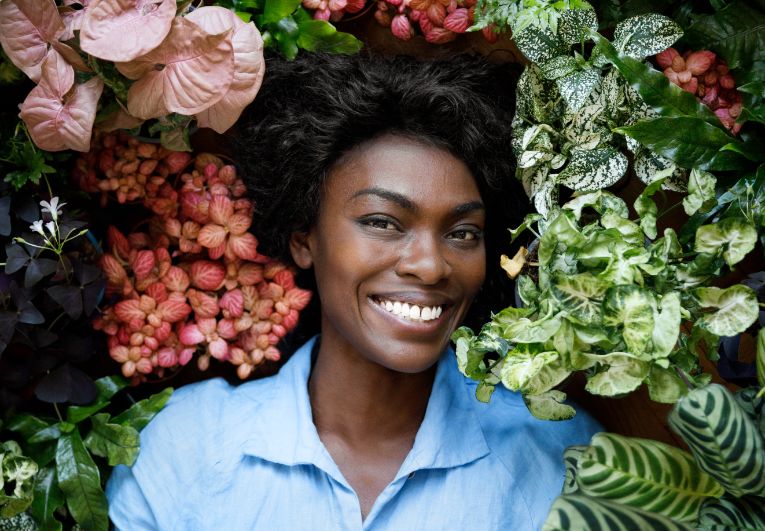
“Wait a second… I can’t be the only one with this issue.”
Deborah Choi, the founder of Bosque, brought plants into her home with the purpose of brightening the space.
“I lived in these big cities: Chicago, New York, now Berlin. I didn’t have access to nature. So, I wanted to bring it inside.
“What could go wrong?”
The Definition of Insanity
The feeling of bringing a happy philodendron into your house only to watch it slowly die is discouraging. You ask yourself what you did wrong. Did I water it too little? Too much? Did it need sunlight? Am I supposed to feed it?
So, you bring in another philodendron. This time you know you’re going to do better. You bought different soil, another kind of pot, you did some Googling. You got this. Right?
Nope. It’s dead. You killed it. Again.
It can feel like a curse, no?
“I went through these cycles of buying plants, buying soil, buying pots, and doing it all wrong. With the results that my plants would die and I would repeat that process over and over. Which is the definition of insanity, right?
“That started this rabbit hole. What’s going on in this industry? What are the customer problems?
I saw the opportunity and built Horticure around that.”
Choi founded Horticure, and on-demand plant-care company at the end of 2018. The plant of your choice, and everything you need to take proper care of it, is provided via mail. If you have any kind of question or concern, there is flexible virtual access to vetted horticulturists.
“Even pre-COVID we were doing these video chat consultations.”
Horticure is now merging with Bosque, a direct-to-consumer plant-care company.
“The conversation about joining forces and seeing what that would be like came together very organically. There were a lot of conversations, testing, figuring out. We decided that the future was brighter, stronger, and greener together.”
Deborah Choi is a natural entrepreneur with a great sense of trends. But it didn’t start that way.
The Safe, Traditional Path
Born in Nigeria, her family moved to Ohio for greater access to education and opportunities. Like any child who wants to make their family proud and secure, Choi sought a traditional path. A good university, a good graduate program, stable income, “the American dream,” it was all part of the plan.
After graduating from the University of Chicago, Choi relocated to New York City. She quickly found friends.
“We were going to thrift stores and flea markets for fun, finding cool things. This was the early 2000s, everyone was kind of talking about the internet. We thought, ‘let’s build a website and see what happens if we put stuff online.”
And that’s where it all began.
Choi describes her career as taking an opportunity presented and running with it. This has led her on a series of ventures including a media company. If she was interested, curious, and excited about it, Choi pursued it.
This characteristic drive has led Choi from selling cool New York thrift store items to a growing Berlin-based plant-care company called Bosque. If you’re struggling to connect the dots, you’re not alone. This entrepreneurial journey Choi embarked on in the early 2000s has twisted and turned in ways that have ultimately shaped Choi into the success she is today.
She now chooses to take that success and pay it forward. Enter Founderland.
A Community for Women Founders of Color
“What we’re doing is accelerating the business success of women of color founders here in Europe and the UK.”
By fostering a community of women founders of color and connecting them with the right people, Choi and company hope to create a fresher, more diverse generation of entrepreneurs. We know the obstacles women of color face in just about every industry. Taking the effort to provide a community the tools it needs to thrive is one of the more innovative efforts in the last few decades.
“When we think of entrepreneurship, we see the highlights, the showreels, the major funding rounds. And it can seem intimidating.
“One of the reasons why I and my co-founders built this community is because there was a lack of one.
“Building a community is truly a lot of work, but let’s take the first step.”
You can learn more about Deborah Choi, her journey, her ventures, and her mission on Spotify’s The Black Founders Podcast. Founderland is fundraising and actively seeking women of color founders to aid in their journey. She currently lives in Berlin where she is expanding Bosque from Berlin to all of Germany.
Her houseplants are much happier now.
Chris Blondell is a Philadelphia-based writer and social media strategist with a current focus on tech industry news. He has written about startups and entrepreneurs based in Denver, Seattle, Chicago, New Haven, and more. He has also written content for a true-crime blog, Sword and Scale, and developed social media content for a local spice shop. An occasional comedian, Chris Blondell also spends his time writing humorous content and performing stand-up for local audiences.

You may like
Business
What’s the Best Logo Design Agency in San Francisco?
Published
6 hours agoon
February 12, 2026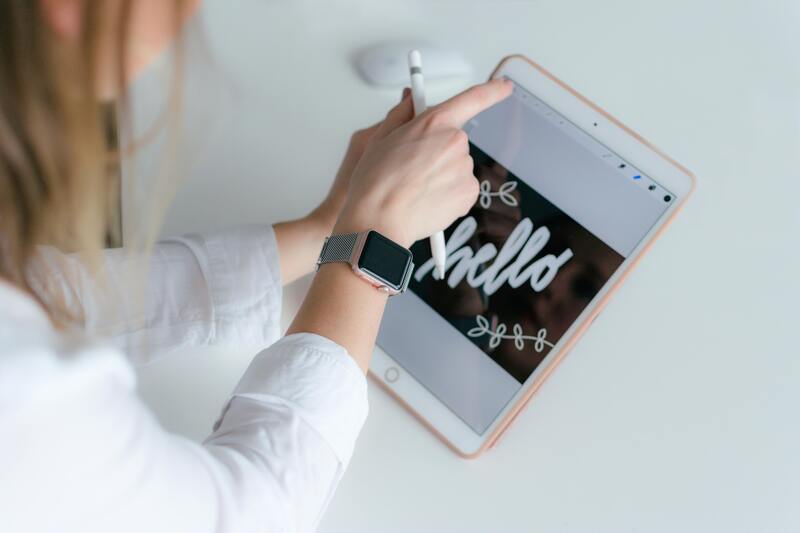
TL;DR: San Francisco is a hub for design innovation, but finding the right partner can be tough. We’ve reviewed the top contenders to help you find a logo design services that blends creativity, strategy, and results.
San Francisco’s not just a hotbed of technological innovation, it’s a hub of creativity where how you design your brand’s engagement with the world matters. From early stage startups in SoMa to established corporations in the Financial District, finding the perfect logo designer is essential for making a great first impression and with a high intensity of competition, you need to make sure your logo counts.
A logo is paramount. 75% of consumers associate a brand with its logo, which makes it the most vital brand image. Your logo is your brand, your promise, your possibility. Finding a logo designer isn’t just an art test. The best logo design agency San Francisco has to offer will get your business the logo it needs for a stellar first impression.
1. Penji

Looking for graphic design services that are not your typical agency? Penji delivers. Penji is a subscription-based graphic design service that offers an agency-level experience without the high price tags or lengthy turnaround times. It’s design as a service, reimagined for the speed of modern business.
What makes Penji the best logo design agency in San Francisco for many businesses is their unique “guided by designers, fueled by AI” approach. You get access to the top 2% of talent who use advanced tools to deliver variations and concepts at lightning speed. You aren’t just getting a logo; you’re getting a scalable creative team that can handle everything from branding to motion graphics.
2. DD.NYC
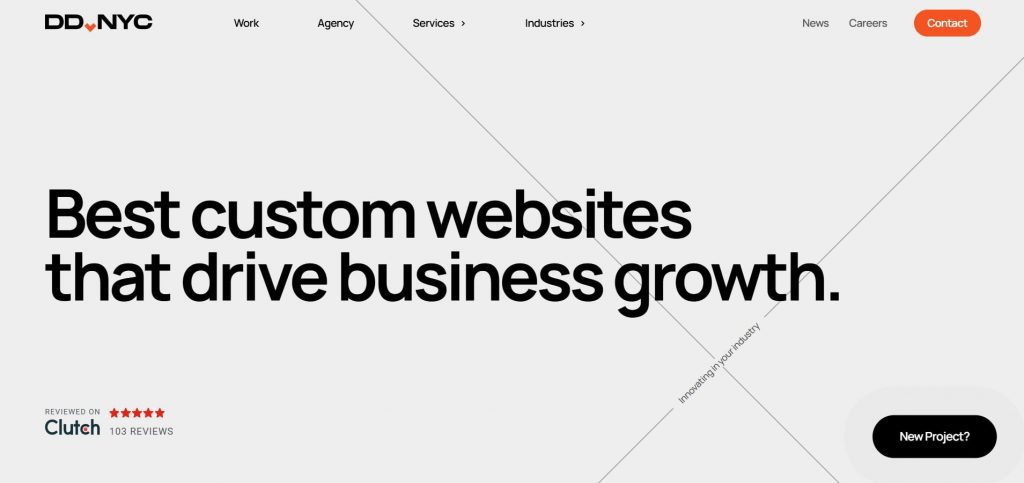
DD.NYC may have NYC in the name, but they provide global-caliber branding for the San Francisco market. They are an award-winning design studio focused on “unforgettable brands” through strategy and design.
If you want an agency that considers logo design part art, part business, this is a strong choice. They have a diverse portfolio ranging from luxury real estate to innovative technology, proving their adaptability in the branding space. This agency goes beyond logo creation to provide a full visual ecosystem, helping firms win awards and dominate their markets.
3. Ramotion
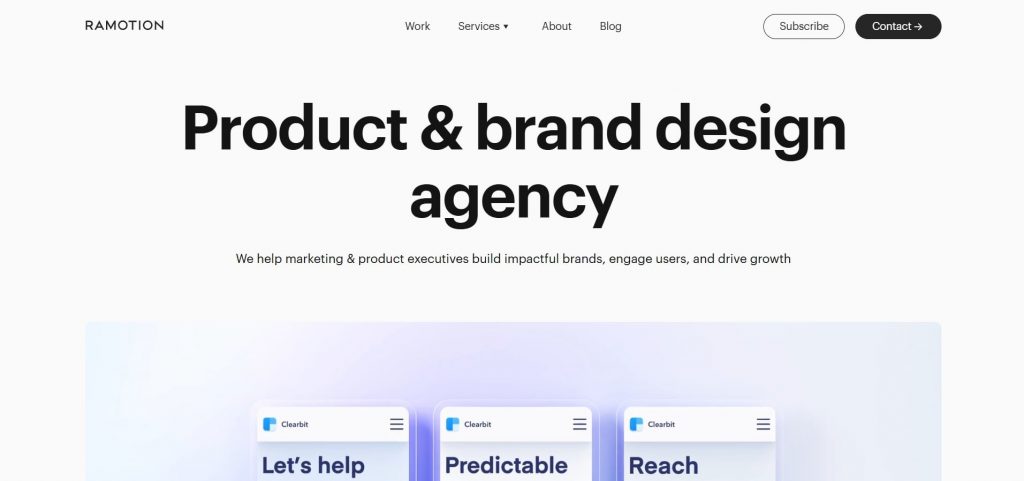
Ramotion is focused on product and brand. They are the ideal agency for “tech-powered” firms, so they fit right in with San Francisco. Their logo designs feature a contemporary aesthetic with a digital, user-focused element.
With Ramotion, you get more than a logo; you get screen-optimized brand identity design. They target marketing and product leaders who want to create memorable brands. Their clients include Firefox and Stripe, so they are a strong contender in the branding space.
4. Small Projects Bureau
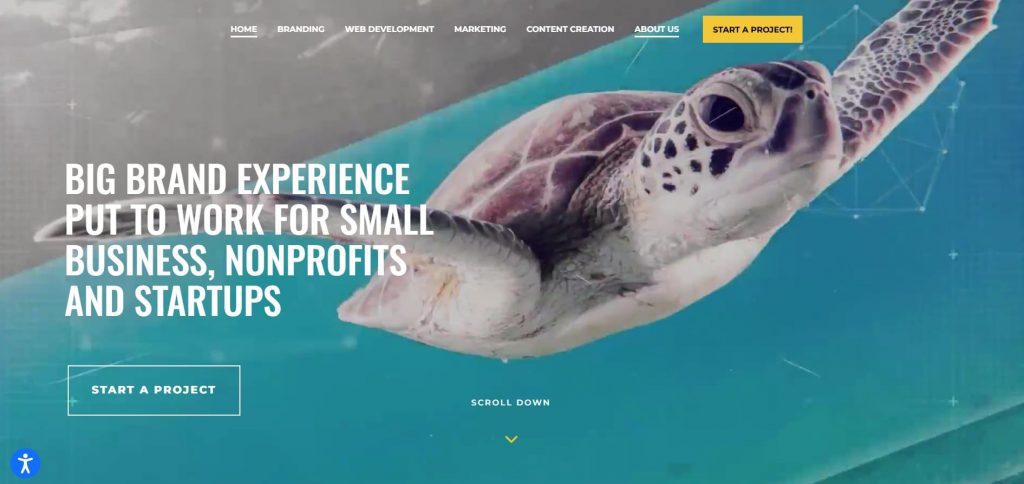
Don’t let the name fool you—Small Projects Bureau brings “Big Brand Experience” to small businesses, nonprofits, and startups. Their team is composed of specialists with Fortune 500 backgrounds who leverage high-level skills to help smaller organizations look like industry giants.
They are an excellent choice if you need logo design services that feel personal yet professional. They focus on creating “attractors”—compelling brands that pull customers in. Whether you are a nonprofit trying to change the world or a niche startup, they apply the same rigorous branding principles used by massive corporations to help you punch above your weight class.
Credit for cover image: Photo by Marek Levak on pexels

Software-as -a-Service (SaaS) is no longer just a convenient way to access software through the cloud. In 2026, the software-as-a-service business model is now the very backbone of how modern businesses operate and scale. In fact, data tells us that SaaS and enterprise software companies have raised about $4.7 billion in investments in 2024.
In this guide, let’s break down how the SaaS business model works, why it continues to dominate the software industry, and what has changed leading into 2026.
What Is SaaS?
SaaS is a delivery model of centrally hosted software that is licensed to customers via a subscription plan. If a company leases its software through a central, cloud-based system is technically a SaaS company.
These companies maintain responsibility and oversight of servers, databases, and any relevant software that allows people to access and use their products.
Some of the most popular SaaS giants in 2026 include:
- Adobe
- Google Workspace
- Salesforce
- Microsoft 365
- Notion
- Canva
- OpenAI
- Grammarly
In 2026, SaaS applications are often enhanced by built-in AI capabilities, such as in the cases of OpenAI, Grammarly, and many others.
The way that SaaS companies lease their product is through subscription plans. These plans can vary greatly from company to company. SaaS business models offer different services and different applications within their systems. Different subscription plans give different access to different services. Many offer a regular plan with one or two other plans that offer more access and increased services.
What Is The Software As A Service Business Model?
The software as a service business model includes a number of factors that are unique to it. There are three in particular that are important to take note of.
Recurring Payments
In SaaS, clients do not buy hardware. The software as a service business model involves providing a subscription service for software. Recurring payments typically take the form of Monthly Recurring Revenue (MRR), though many SaaS companies now track additional metrics like Annual Recurring Revenue (ARR), Net Revenue Retention (NRR), and expansion revenue.
When your customer signs up and subscribes, you will get some money upfront. It is imperative that this initial cash not be counted as revenue until it’s been properly earned. It is a liability until the terms of service have been completed. A customer can ask for that money back at any point if the service isn’t delivered.
Revenue recognition is one of the most fundamental aspects of running a successful SaaS company. Alongside subscriptions, SaaS companies also monetize through usage-based pricing, AI consumption pricing, or hybrid billing models that combine multiple approaches.
Heightened Customer Retention
All businesses care about customer retention. In SaaS business models, however, it is ten times more important. Customer retention is what keeps SaaS companies afloat. Because you cannot lay claim to all of your customers’ subscription money until the term of service has been completed.
If you sign a customer for one year or twelve months and they leave after two, then you’re without ten months of recurring revenue. As a result, it is critical to put a significant value on cultivating customer relationships and upselling.
An existing SaaS customer spends more money on average than a new one. It is in a SaaS company’s best interest to upkeep and maintain higher-quality customer service. If you don’t, or if the quality of customer service is poor, your customer is very likely to jump to a competitor.
No matter how great the product, poor customer service can break a company.
Consistent Updates
SaaS companies must continuously release updates, security patches, AI model improvements, and new automation capabilities to stay competitive and retain customers. Plenty of companies provide “next-gen” product versions, but SaaS has to continuously update and patch to stay above water.
This is now standard across modern cloud software, where continuous deployment and rapid feature iteration are expected by customers. Software vulnerabilities can put customer information at risk from hackers. Nobody wants that. That’s why continuously assessing and updating security fixes is a top priority in the software as a service business model.
Since SaaS companies host their own products, they can push updates as needed. They can release new features or enhance prior versions whenever they want. Between consistent updates and quality customer service, SaaS companies have the potential to be highly responsive to customer base feedback.
This is a real-time luxury that most other industries do not have.
How Are SaaS Companies Built?
Generally speaking, there are three critical stages as to how to build and develop a SaaS company: Setup, Growth, Stabilization.
Setup
This is the early stage where the company establishes its foundation. These are fairly typical processes. Founders discover the need for the products they intend to develop, identify their target market, and create the product.
This is also the opportunity to create an effective marketing campaign and sales strategy, consider various customer support plans, and organize finances.
Growth
Once the product has hit the market, it’s time to expand. This is arguably the fun part. Because there is seemingly no limit to how far a SaaS company can expand in its market, it’s possible for a SaaS company to expect new customers. This creates a sudden demand for marketing, sales, and customer service teams.
This is when a company has to act quickly in order to capitalize and secure a loyal customer base. Ideally, this growth will be accompanied by additional revenue. Companies then reinvest the capital back into their products and services. That way, they have the resources necessary to meet their customers’ needs.
Stabilization
Now that the business is beginning to acclimate with a steady incoming stream of customers, that means the company does not have to invest in more overhead. If the SaaS company has wisely invested in customer service software, marketing automation, and consistent product updates, it is on the right track to stabilization.
Why This Business Model Works
The SaaS business model is now a mature and dominant software delivery standard across nearly every industry. You can find the evidence of this in the vast investments in SaaS. How many office spaces use Slack to communicate? How many designers use Adobe? As our technology advances, so does the SaaS industry.
While the SaaS market remains full of opportunity, success in 2026 requires strong differentiation, AI integration, and clear customer value.
Featured Image Credit: Photo by Markus Winkler from Pexels
Business
Top 10 Email Marketing Software Modern Businesses Need Today
Published
7 days agoon
February 5, 2026
For many business owners, video marketing may seem like the best strategy. However, studies show that email remains a powerful channel for promoting your brand. If you want to jump on the bandwagon, you’ll need reliable email marketing software. Fortunately, we compiled a list of the best to help you decide.
1. Brevo
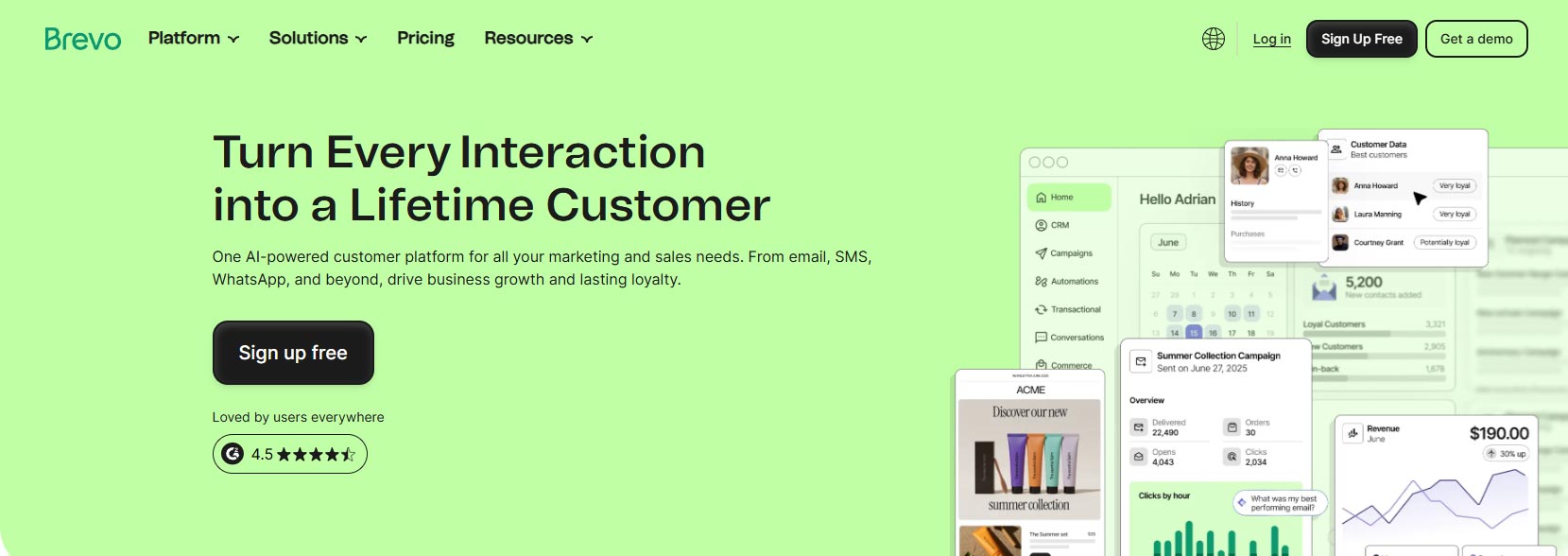
Most email marketing software applications these days have an all-in-one marketing solution, and an example of an all-in-one marketing platform like this is Brevo. Formerly known as Sendinblue, it lets you design emails on its platform using its drag-and-drop features. But if you’re not a designer, don’t fret! You can use templates to create email newsletters. Aside from that, you can personalize their emails by adding your subscribers’ names. Plus, you can also segment emails or A/B test emails to different groups.
No wonder Sendinblue is one of the best email marketing software applications on the market.
Pricing:
Free
Starter – $9/mo
Standard – $18/mo
Professional – $499/mo
Enterprise – Contact sales
2. MailChimp
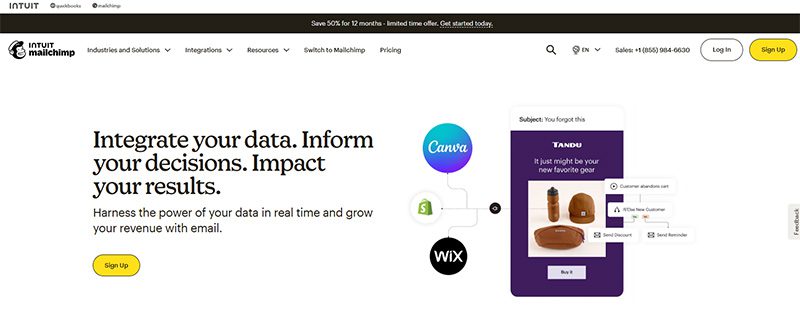
This top 10 email marketing software list won’t be complete without mentioning MailChimp. After all, MailChimp is one of the original email marketing software platforms. And even though they have been there for a long time, MailChimp’s pricing remains affordable for small businesses. But MailChimp is no longer just an email marketing software application since it expanded its list of features in the last few years. Here’s what to expect when you’re subscribed to MailChimp for your email marketing strategy:
- Drag-and-drop email builder
- Email templates
- Content optimizer
- Customer journey builder
- Analytics and reports
Pricing
Free: For 250 contacts
Premium: Starts at $175/mo, for 500 contacts
Standard: Starts at $10/mo, for 500 contacts
Essentials: Starts at $6.50/mo, for 500 contacts
3. Salesmate
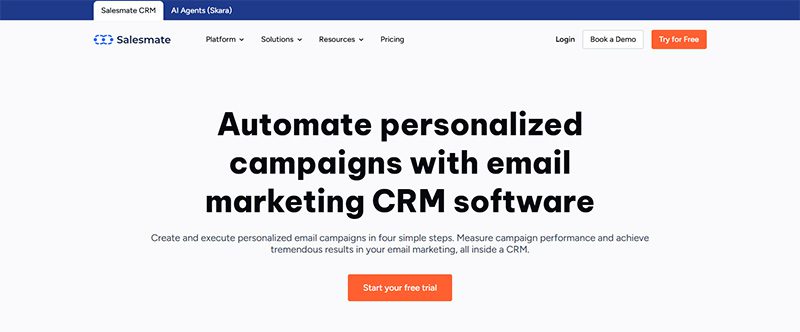
Salesmate is an amazing CRM and customer journey software. It might be one of your company’s best cost-to-value investments because it can be a beneficial tool for your sales, marketing, and customer experience teams.
Specifically speaking of marketing teams, Salesmate is a potent email marketing CRM that assists you in quickly designing and implementing campaigns.
Email campaigns are created using a drag-and-drop journey builder by Salesmate.
Using different metrics, such as Live Views, Campaign Goals, Automation Logs, etc., you can quickly monitor the effectiveness of your campaigns. You have enough information from that to run A/B tests on campaigns and find the best fit.
Pricing
Basic: $29 per user/ month
Pro: $49 per user/ month
Business: $79 per user/ month
4. Omnisend
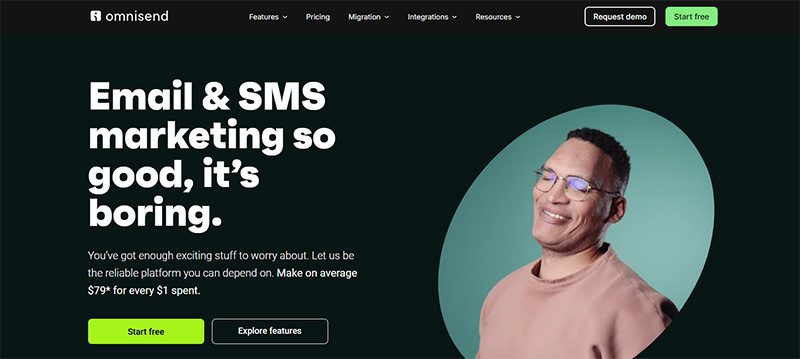
Here’s another email marketing software for eCommerce businesses. Omnisend will help you increase sales through campaigns and automated workflows as well. They make it easy and simple for you to create beautiful email designs to send to subscribers.
Plus, creating promotional emails through their drag-and-drop builder and content blocks is faster. In addition, you can also segment emails and optimize them through A/B testing and boosters. And if you want to improve your email marketing efforts, Omnisend lets you access reports and insights, too.
Pricing
Free
Standard: $11.20/mo
Pro: $41.30/mo
Custom: Contact Sales
5. Kit

Kit ensures that your emails don’t get filtered, and your subscribers will read every email you send them. They make it so through their amazing email templates and styling options.
Similar to other email marketing software applications here, you can integrate your email marketing efforts with other strategies, like building a landing page or sign-up forms. Plus, you can also segment your subscribers and automate your email funnel. And if you want to improve your campaigns, Kit presents you with data.
And if you’re a creator, Kit is the BEST email marketing software for you.
Pricing
Newsletter: Free, up to 10,000 subscribers
Creator: $39/mo, for 1,000 subscribers
Pro: $79/mo, for 1,000 subscribers
6. Campaign Monitor
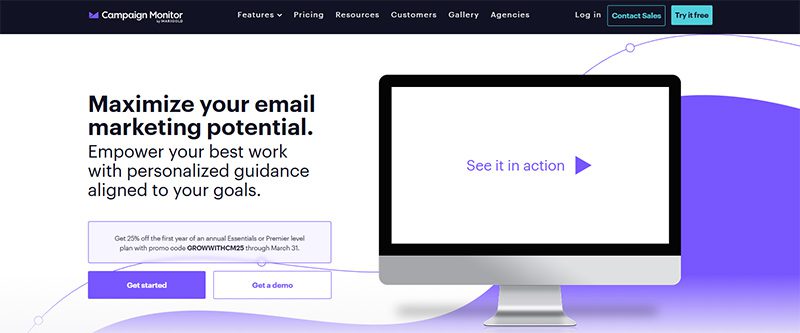
If you want to combine email marketing with your SMS marketing efforts, Campaign Monitor is your best option. Of course, like the others on this list, you can design your emails through their drag-and-drop builder and email templates, personalize emails, and create customer journeys.
Aside from those, one feature that helps Campaign Monitor to stand out from the rest is its Link Review. Before sending your email newsletter, Campaign Monitor will check if there are any dead links.
Pricing
Lite: $12/mo
Essentials: $29/mo
Premier: $159/mo
Enterprise: Contact Sales
7. EmailOctopus
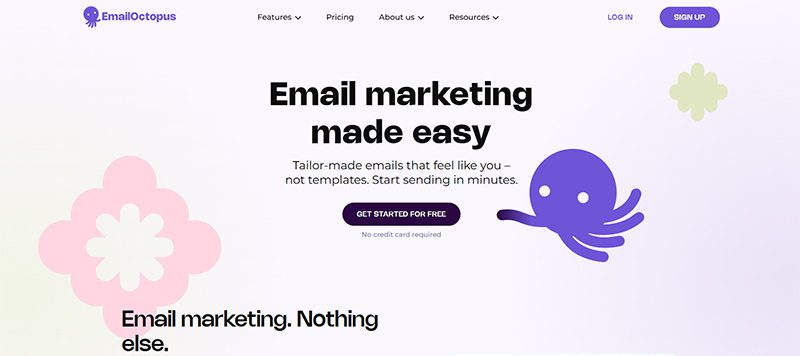
If you want customized email designs, EmailOctopus helps you create designs from scratch. Aside from that, you will also find the exact features in any email marketing software, such as landing page creation and data analysis. In addition to that, you can connect EmailOctopus with other apps, such as Shopify, Squarespace, and Gravity Forms.
Pricing
Starter: Free
Pro: $10/mo (500 subscribers, 10,000 emails)
8. Constant Contact
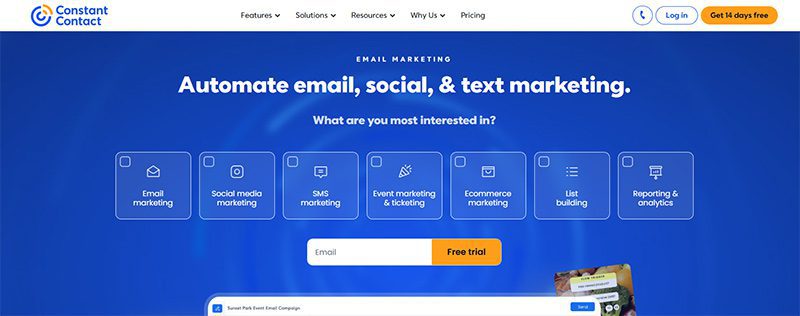
Constant Contact simplifies its features into three categories: do, reach, and engage. With “do”, businesses can create email templates, manage their customer list, automate emails, and know how to improve their campaigns through data.
For reach, you can integrate your email marketing campaigns with Google and social media ads, landing pages, and sign-up forms.
And finally, for engage, you can engage with your target audience by publishing social media posts and surveys or polls.
Pricing
Lite: $9.99/mo
Standard: $35/mo
Premium: $80/mo
9. HubSpot Email Marketing
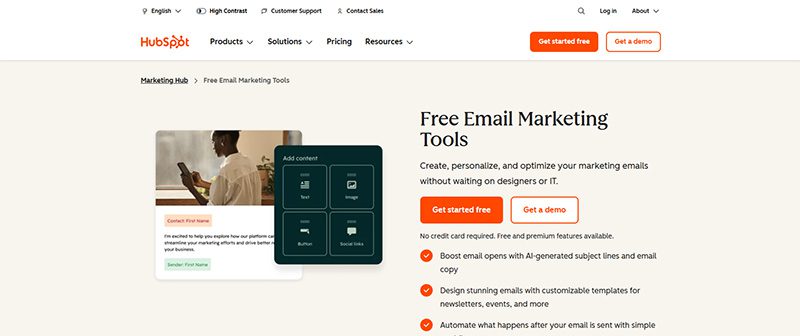
The reason many love HubSpot is they offer free tools for marketers. That’s the case for their email marketing software. Marketers can use them for free and get access to amazing features, such as a built-in email design editor, personalization, and A/B testing.
HubSpot recommends that you also use their CRM to get more out of your email marketing strategy. But if you need to level up your email marketing efforts, you can subscribe to HubSpot’s Marketing Hub. This gives you access to other marketing features.
Free
Starter: $9/mo/seat
Professional: $800/mo
Enterprise: $3,600/mo
10. Moosend
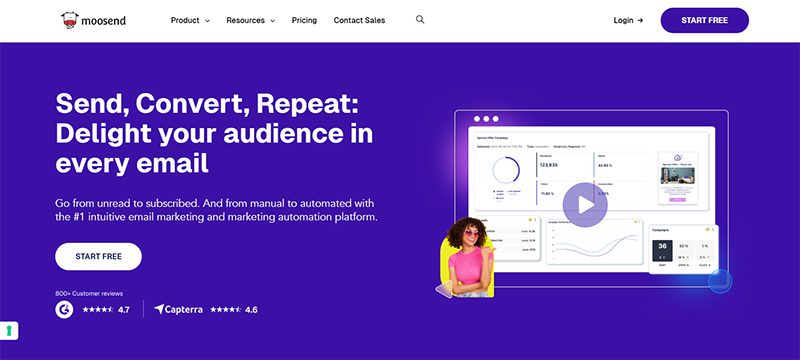
If your business is part of these industries: eCommerce, travel, publishers, SaaS, and agencies, Moosend is the best option for you. You can rely on Moosend to have the basic features of any email marketing software, such as automated workflows, design, and personalization. Aside from their regular pricing tiers, you can also buy email credits from Moosend if you want to send more newsletters or campaigns to more subscribers.
Pricing
Free Trial (30 days)
Pro: $7/mo
Moosend+: Contact Sales
Enterprise: Contact Sales
Key Thoughts
These software applications have become the most trusted names in email marketing. Not only that, but they are also beginner-friendly software applications to make it easy for you to create and send emails in minutes!

What’s the Best Logo Design Agency in San Francisco?

What’s the Best Logo Design Agency in Florida?

What’s the Best Logo Design Agency in Texas? Here’s How to Choose

Here are the Best Design Agencies in New Jersey in 2026

The Biggest Hidden Cost in Agencies Isn’t Talent — It’s Throughput

The ‘Boring’ Internal Upgrade Behind Many $100M-Scale Companies

What’s the Best Logo Design Agency in Chicago?

OpenStudio – Business Management All-In-One

Top 10 Email Marketing Software Modern Businesses Need Today

The Software As A Service Business Model Explained

Top 10 Artificial Intelligence Solutions Your Business SHOULD Use

The Biggest Hidden Cost in Healthcare Isn’t Staff Time. It’s Operational Friction.

5 Quiet Operational Leaks Costing Fortune 500s Millions

The Biggest Hidden SaaS Cost Isn’t Ads—It’s Post-Click Execution
Trending
- Uncategorized3 days ago
The Biggest Hidden Cost in Agencies Isn’t Talent — It’s Throughput
- Uncategorized3 days ago
Here are the Best Design Agencies in New Jersey in 2026
- Uncategorized3 days ago
The ‘Boring’ Internal Upgrade Behind Many $100M-Scale Companies
- Uncategorized11 hours ago
What’s the Best Logo Design Agency in Texas? Here’s How to Choose
- Uncategorized8 hours ago
What’s the Best Logo Design Agency in Florida?
- Business6 hours ago
What’s the Best Logo Design Agency in San Francisco?





